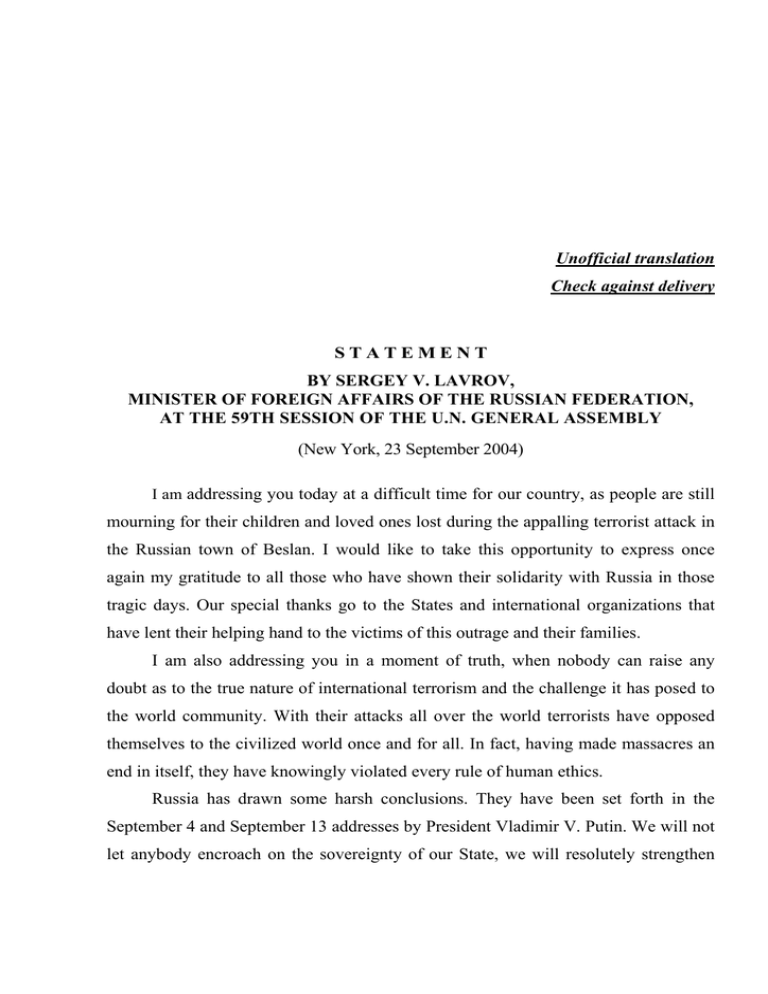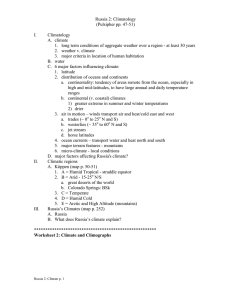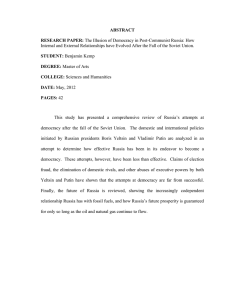Unofficial translation Check against delivery BY SERGEY V. LAVROV,
advertisement

Unofficial translation Check against delivery STATEMENT BY SERGEY V. LAVROV, MINISTER OF FOREIGN AFFAIRS OF THE RUSSIAN FEDERATION, AT THE 59TH SESSION OF THE U.N. GENERAL ASSEMBLY (New York, 23 September 2004) I am addressing you today at a difficult time for our country, as people are still mourning for their children and loved ones lost during the appalling terrorist attack in the Russian town of Beslan. I would like to take this opportunity to express once again my gratitude to all those who have shown their solidarity with Russia in those tragic days. Our special thanks go to the States and international organizations that have lent their helping hand to the victims of this outrage and their families. I am also addressing you in a moment of truth, when nobody can raise any doubt as to the true nature of international terrorism and the challenge it has posed to the world community. With their attacks all over the world terrorists have opposed themselves to the civilized world once and for all. In fact, having made massacres an end in itself, they have knowingly violated every rule of human ethics. Russia has drawn some harsh conclusions. They have been set forth in the September 4 and September 13 addresses by President Vladimir V. Putin. We will not let anybody encroach on the sovereignty of our State, we will resolutely strengthen 2 the unity of the country and its people in order to counter terror, to guarantee secure and decent life to our citizens in freedom and democracy. The measures to achieve these goals announced by the Russian President will be based on the country's Constitution, and we will continue to defend our legitimate interests by means of equitable dialogue, cooperation and partnership, rather than by means of confrontation. In this regard, readiness for honest cooperation in fighting terror with no double standards has become a key criterion of our relations with any State. We must enter a crucially new stage in the activities of the anti-terrorist coalition. The meeting of the U.N. Security Council of September 1 demonstrated a strong determination of the world community to continue its fight against terrorism in a consistent way. It is important now to translate this commitment into practical actions as soon as possible. In three years that have passed since the terrorist attacks in New York City and Washington, a lot has been done to develop a workable partnership in this area. However, little has been done compared to the scale of the threat. It is important to learn lessons from the experience gathered and make conclusions for the future. First. The global nature of the terrorist threat testifies that security in today's world is indivisible. Consequently, we must bear collective responsibility for making the world secure. The fight against terrorism should unite States rather than oppose them to each other. We can deal with this evil on a multilateral basis only by consolidating our efforts and acting in the spirit of solidarity. As far as our country is concerned, President Vladimir V. Putin said that Russia regards the strengthening of the anti-terrorist coalition as one of the most important tasks. A special emphasis should be placed on intensifying interaction between special services, which, we believe, should reach a crucially new stage in terms of credibility and coordination. 3 Second. A clear strategy and a generally acceptable legal framework are the prerequisites for success in combating terrorism. This framework has been laid down in Resolution 1373 of the Security Council and its subsequent decisions. However, additional efforts are needed at this point. They include making necessary amendments to the national legislation, acceding to international anti-terrorist conventions and finalizing new international legal counter-terrorism instruments. In the circumstances, when international terrorism launched war on our entire civilization, a particular focus is placed on the determination of States to use their right for self-defense in conformity with Article 51 of the U.N. Charter. International law is clearly not an inalterable dogma. The fight against terrorism calls for its development and improvement. Third. The time has come to renounce double standards once and for all when it comes to terror no matter what slogans it uses. Those who slaughtered children in Beslan and hijacked the planes to attack the U.S. are creatures of the same breed. Harboring terrorists, their connivers and sponsors undermines the unity and mutual trust among participants in the anti-terrorist front, justifies actions of terrorists and actually encourages them to commit the same crimes in other countries. I would like to remind you that the U.N. decisions oblige the States granting political asylum to examine personal records of every individual to make sure he/she has no links to terrorists. Attempts to use the fight against terrorism in various geopolitical games are all the more counterproductive and risky. Fourth. The atrocity of the recent terrorist attacks proves the need to ensure reliable safeguards against terrorists gaining access to the weapons of mass destruction. Russia is prepared to the closest international partnership in this area. Our country became one of the sponsors of Security Council Resolution 1540, takes part in the Proliferation Security Initiative (PSI) and co-sponsors the G8 Action Plan on Non-Proliferation. These initiatives are complementary and should increase the 4 effectiveness of the WMD non-proliferation regimes, which seems to be especially relevant on the eve of the 2005 NPT Review Conference. Fifth. Terrorism increasingly interweaves with drug trafficking. The drug flow from Afghanistan has acquired a global significance. The implementation of a set of social, economic and law-enforcement measures within and outside the country becomes more urgent than ever. One of the key elements of this strategy lies in strengthening the existing anti-drug "security belts" and creating new ones. Russia makes a considerable contribution to solving the drug problem, including through the elaboration of specific legal, political and operational measures within the Shanghai Cooperation Organization and the Collective Security Treaty Organization. We are ready to coordinate actions with the ISA government, multinational and coalition forces of the country. Sixth. International terrorists have neither nationality nor religion. On the contrary, it is religion and national culture that require utmost protection today against the destructive effect of any kind of extremism. To do it, we need a considerate dialogue between different confessions and civilizations. Russia that is open both to the West and the East is ready to play its part in this process intended to prevent civilization split. Another pressing task is the saving of monuments of spiritual and material culture from terrorist impingement. We deem it essential to develop cooperation in this area between the United Nations and its specialized agencies, primarily UNESCO. Failing to act as well as tacitly observing the desecration of memorials to World War II heroes and victims and attempts to exculpate fascists can only play into the hands of those who seek to incite extremist sentiment in society. Seventh. Russia believes that the United Nations should continue to play a central role in uniting efforts of the international community in its fight against terrorism. As Chair of the Counter-Terrorism committee, our country intends to 5 actively contribute to speeding up its reform. We suggest that a new UNSC resolution be worked out to ensure the most effective functioning of the CTC, early identification of weak links in the antiterrorism network and increased practical cooperation between the CTC and international and regional organizations, including the CIS, CSTO and SCO. The Commonwealth of Independent States Summit that was held recently in Astana confirmed a high potential of regional structures within the CIS in every area, from anti-terrorist activities and collective security to reinforcing economic integration. Certainly, in the increasingly interdependent world counter-terrorism efforts can only be considered in the context of other pressing issues facing the world. This is especially relevant to the settlement of conflicts, which have been destabilizing the situation at the regional and global levels for decades. The General Assembly should, through its decisions, contribute to the Middle East settlement on the basis of commitments by the parties under the "road map". Such progress is a prerequisite for the development of an extensive and equal partnership in order to assist the Middle East countries in making the necessary transformations, in particular within the framework of cooperation between these countries and G8. The situation in Iraq is a cause of serious concern. Russia is willing to support in every way possible the process of political settlement aimed at preserving the territorial integrity, ensuring political sovereignty and genuinely democratic postwar recovery of Iraq. To search for national reconciliation in Iraq is of utmost importance and an international conference, which would bring together all the major Iraqi political forces, neighboring countries, members of the Security Council and the Arab League could help the Iraqis in this regard. We cannot lose sight of such a dangerous hotspot of tension as Kosovo. There should be no room for complacency here. We need to make efforts to ensure that the 6 universally recognized standards of human rights and rights of national minorities be applied in the region as well as to prevent its transformation into a hotbed of terrorism and drug trafficking in the very heart of Europe. We also need to make a full use of the existing mechanisms of conflict settlement in the CIS area. Consolidating peacemaking capacity of the international community is crucial for overcoming regional crises. Collective response to humanitarian crises, in particular those on the African continent, in total compliance with the U.N. Charter and in the spirit of partnership with the regional structures leaves no doubt that the U.N. Charter remains a universal basis for the effective solution of such problems. The U.N. should equally give close attention to other global threats to security and sustainable development. This concerns the eradication of poverty and illiteracy as a breeding ground for extremism. Annually our country grants one thousand scholarships to African students. Russia contributed USD 7.5 mln to the fund for combating HIV/AIDS and provided humanitarian assistance to some African countries on the bilateral basis. This also concerns the search for ways to bridge the gap between poor and rich States. Russia makes its contribution here, and in the period of 1998 to 2002 it wrote off the debt of African countries worth USD 11.2 bn. It also includes maintaining environmental security, and I would therefore like to confirm that in accordance with the decision of President Vladimir V. Putin we are seriously considering the ratification of the Kyoto Protocol. And one of our tasks is to prevent outer space from becoming the scene of an armed confrontation. Together with China we propose to conclude a comprehensive agreement to this end and call upon all the countries with a space capability to join this initiative. Furthermore, a need is arising to elaborate a U.N. convention on international outer space law. 7 This includes the fight against gross and massive violations of human rights, ensuring security and dignity of an individual. The United Nations, OSCE, the Council of Europe and other organizations should not look indifferently at the situation in some countries where a considerable part of population is deprived of citizenship and, consequently, of basic political, social and economic rights. On Russia's initiative, the U.N. General Assembly at its 57th and 58th sessions adopted resolutions on the elaboration under the U.N. aegis of a global strategy to counter new challenges and threats. They contained specific guidelines for bringing the international community closer to a new security model that would reflect the nature of global challenges of the 21st century. It is in this direction that the High-Level Panel on Threats, Challenges and Change established by the Secretary-General organizes its work. We expect that its recommendations will pave the way for a true increase in the U.N. efficiency. At the same time, the reform of the Organization, and particularly that of the Security Council, should be based on the broadest possible consensus and should not provoke the alienation of States. The world community goes through a difficult period of establishing a new system of international relations. It is already clear that this is a long-term process with uncertain and hardly foreseeable consequences. At the same time, unsolved problems and new dangerous challenges to the security and development of mankind are growing in number. We still lack a collective strategy and generally applicable mechanisms for responding to these challenges. In fact, we have to constantly improvise and use makeshift means to ensure world stability. A question arises as to whether we could find ourselves, and rather soon, in a situation when events would start to go beyond our control. Maybe it is time for the world community to assume an active role in global processes and take targeted actions to establish a more secure and just world order? 8 Russia is fully determined to build such a world order and take a proper place in it as a free and democratic State. More than half a century ago, the civilized world put aside all its disputes and differences and mobilized its efforts to counter the deadly threat of Nazi enslavement. The enemy that opposes us today is no less dangerous and merciless. Russia sincerely hopes that the forthcoming 60th anniversary of the end of World War II and the establishment of the United Nations will become a historic milestone in moving ahead to a world order that would make the 21st century an era of predominance of the lofty principles of peace, stability and development underlying the U.N. Charter.







